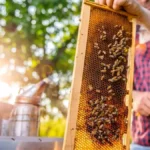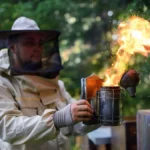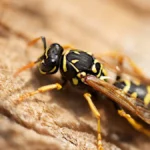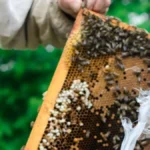Bees have a barbed sting. When they sting something with thick skin the sting will get stuck in that skin. The bee sting then pulls out of the bee and the bee will die a bit later. Now, some of us may be tempted to ask ” Do bees know they die when they sting? ” As you will see in this article, this question is difficult to answer. But we are all about answering difficult questions, so let us give it a bash!!
How Does A Bee Sting Work?
A bee sting is a modified ovipositor. An ovipositor is something female insects use to lay eggs. In the case of the bee, it sticks the sting into the target. The venom is then injected into the target, and the barbs in the sting will lock the stinger into the target. If the target is you, a human being, or your pet, the skin of the target holds the barbs in the sting.

Learn more about: Why Don’t Bees Sting Beekeepers?
Parts Of A Stinger
The stinger itself (the bit that goes into you) has three parts. The main injecting part is called the stylus – stylus is Latin for a pen, and in some ways, it is a bit like a pen. The tip is sharp and can penetrate easily into thick skin.
On either side of the stylus, there are two lancets. These are crafty barbed devices that draw the sting into the flesh. One side will be drawn in and pull the stylus in a but, and then the other side lancet pulls in a bit and pulls the stylus further in. It wiggles backward and forwards like this and enters the flash.
Here I show a few learners how to remove some bee stings. I personally find that a few stings every now and then make me feel healthier. I have been stung about 35 000 times or so in my life. This is an estimate based on a certain number of stings per month average over the number of years I have kept bees. The most stings I have counted in one “event” is just over 200. Bee stings hurt, but they are not very toxic actually. The worst thing about bee stings is our immune reaction to them.
Apitoxin (bee-venom)
Bee venom is a cocktail of toxins and pheromones and other chemicals that are just there in case they are irritating or poisonous to something. There is an incredible array of toxins in bee venom, but in summary, let’s look at the main ones.
Alarm Pheromone
This smells a bit like banana, and a bit like nail polish. If another bee smells alarm pheromone it will feel compelled to sting, and will most likely sting you as well. This releases more alarm pheromone, and then you get stung more and more. This is why bees often kill animals that cannot get away – a hive gets angry, stings a dog. The dog goes nuts and barks. The bees smell the alarm pheromone and sting it. Then they sting it more and more, and eventually, the dog gets stung a thousand times and dies.
You can mask alarm pheromone with smoke – if you get stung puff smoke over the sting and remove it. If you or an animal get stung a lot – remove yourself from the proximity of the hive. Slowly and methodically – do not run away screaming. You will get stung more.
Histamine
This is actually a really cunning thing to do. Histamine is your body’s own way of triggering inflammation. Sometimes we need this. When a bee injects histamine into you, it uses your own body to trigger reactions that hurt you. This is a bit like a spy going into a gunpowder factory with a fuse! All you need is the fuse to actually use the factory’s own gun powder to blow it up. Histamine is a biological fuse and sets your own natural inflammation time bomb going.
Proteins
There are a whole lot of proteins. Some of these are enzymes that hurt nerves and cells. Others help to cause more histamine to be released. All of these proteins are also big enough to elicit an immune response. This means that over time, your reaction to bee venom gets more intense. This is however also countered by the fact that over even more time, your body will begin to regulate your response to bee stings.
Other Components
There are other irritating components in bee venom. Organic acids such as formic acid (poisonous), and traces of numerous other chemicals many of which are irritating.
Do Bees Know They Die When They Sting?
This is a complicated question. Bees have quite small brains and we cannot really understand what goes on in their heads. They definitely respond to things. They can communicate. They can sometimes solve little problems. They definitely appear happy to see each other at times. Other times they appear angry to see each other.
For an animal with a brain the size of a pinhead, it is difficult to imagine they have awareness of life and death. They have self-preservation instincts yes. But most likely an understanding of the complex transition between being living and being dead is a bit beyond what their brains can comprehend.
From a self-preservation instinct, at some level they are aware of the fact that stinging can carry a penalty, hence they do not sting for no reason. But if they do feel the urge they sting with a sense of purpose that is quite selfless.
Conclusion – Do bees know they die when they sting? Probably not.
Do Bees Always Die When They Sting?
No. A bee sting is barbed. The barbs must be able to stick into something that can hold the barbs tight enough that the bee will pull the sting out of its body. If a bee stings a big ant, or another bee the stinger normally just kills the other insect.
I once got stung by a bee in the very soft tissue on the edge of my mouth – this is epithelial tissue and appears not to be able to hold the stinger. The sting hurt me and then the bee pulled it out and stung me on my nose. I was stung twice by the same bee and ended up looking like a clown with a fat lip and round nose. Most unpleasant.
Why Do Bees Sting If They Die?
This is much like asking a young boy holding a gun in a war what will happen to him. He thinks he is a hero and he will lay down his life to defend his country. Meanwhile, the general in the army is busy making his girlfriend pregnant back home. This is why we get young people to be soldiers – it is easier to put silly ideas in their heads. But by putting a silly idea in a young person’s head we can defend our society against attack. In other words, we hack people’s brains so they are altruistic for the rest of us.
(I have lost many family members who were heroes in various wars – I do not say this out of any disrespect for the ultimate sacrifice they made for whatever belief was fashionable at that time – I just think that for a creature with as big a brain as a human, killing each other to resolve disputes is something we should maybe have moved past by now).
Luckily bees have relatively small brains, so it is far easier to get a bee to be altruistic than a human. Bees sting to defend their hive. The queen is the main reproductive individual in the hive, and the workers are not. The best chance they have of their genes surviving is if the hive survives. As a result, it is genetically in their interests to give up their life so that the hive has a better chance of surviving. Genes are inherently selfish. Do bees know they die when they sting? No – but they do know that if their hive dies their genes die.
How Long Do Bees Live After They Sting?
If they sting me – about two seconds. After a bee stings you, it buzzes around the “target” (you) to call other bees to sting you. Catch the bee and splat it as soon as possible to avoid more stings and loss of life.
In the case of a bee which did not sting me – and stung somebody that does not know this important fact…probably about 5-30 minutes. After a bee stings you, it basically flies away and leaves the lower section of its intestines, and rips its abdomen open. This disturbs its circulatory system. It disturbs its respiratory system. The length of time the bee lives will be short, painful, and sad. In cold weather, it will take a bit longer to die.
I hope this has helped you understand a bit more about bee stings and specifically helped us answer the question “Do bees know they die when they sting?” I always feel bad when a bee stings me – it hurts me for a minute, but it ends the bee’s life. This is a reason to learn how to handle your bees as carefully as possible. If you enjoyed it, please share!
Read more about: How Many Legs Do Bees Have?

Dr. Garth A. Cambray is a Canadian/South African entrepreneur and beekeeper with 28 years of experience in apiculture and specializes in adding value to honey. His Ph.D. research developed a new advanced continuous fermentation method for making mead that has resulted in a number of companies globally being able to access markets for mead. His company, Makana Meadery, exports honey mead to the USA where it is available to discerning connoisseurs. He has also developed technologies to commercially manufacture organic honey vinegar in Zambia for export globally. He holds a few patents globally in the ethanol industry and believes in technology and knowledge transfer for human development and environmental sustainability. One of his proudest achievements is the fact that the wind farm he started at one of his old apiary sites has essentially made his hometown carbon neutral.





